jeffnick
Well-known member
I've towed my boats over 50,000 miles. I was asked if I have any trailering tips or experiences to share...so here goes.
I don't pretend to be an expert; I just know what works for me. And I'm not trying to convince anyone what is right or wrong, just explaining how my trailering has evolved.
My first major satisfaction was to find trailer tires that hold up to the miles and abuse of my excessive trailering. This includes the entire Alaska Highway (which really isn't saying much as it's in better shape than most of our Interstates). I use car radials on my boat trailers. I've put over 40,000 miles on a set of these tires with no problems whatsoever. Just make sure they'll handle the weight you're towing.
The second satisfaction was getting rid of the clunking from the coupler and also eliminating hydraulics and bleeder screws, not to mention being able to apply my trailer brakes from the drivers seat. I use totally electric brakes on my boat trailer. I flush them after saltwater use either by a dunk in a freshwater lake on the way home, or by putting a sprinkler under the trailer for 1/2 hr or so.
The last tip is speed. I seldom if ever pull my trailer faster than 55 mph. This not only saves wear and tear on the rig, but also gets me 12mpg with my V10.
I installed my first set of electric trailer brakes about 4 years ago. I have eyeballed them while doing annual bearing exams, but have never serviced them. On my last 2 trips out, I had one of those brakes drag, as witnessed by excessive temps taken using an IR non-contact thermometer. I always check the hub temps at the first rest area, about 35 miles from home.
Nick’s rules for hub temp.
*If the IR temp is consistently less than 100°, then I loose interest in checking
*If the IR temp is between 100 and 200° I continue to check regularly (+/- 50 miles)
*If the IR temp is between 200 and 300° I let them cool and check them more often
*Over 300° and I find out what's causing it.
The last time out the temp was 330° at 35 miles so I backed off the star wheel to ‘unadjust’ the brakes on that wheel. We made the remainder of the 450 mile round trip with no subsequent problems. . I couldn’t get the pic at max temp cause I was busy working on the problem.
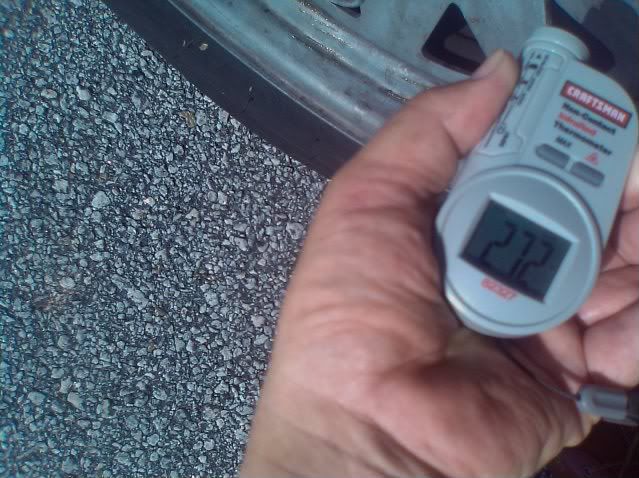
Back home, I pulled the drum to see what was causing the shoe to drag. There was rust in/on pivot points, which kept the shoes from fully retracting.
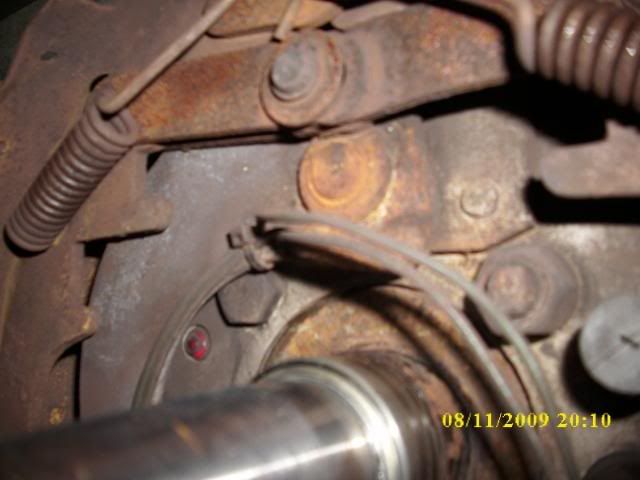
I wanted to see what it would take to make that brake serviceable so I had at it. ‘Rebuilding’ brakes is not on my acceptable list of maintenance items, for about $35 I could have replaced the entire backing plate -- shoes, mechanics, springs, magnet and adjuster, but I was curious. A well-placed shot of Corrosion Block at each pivot point and a dab of grease on the backing plate to shoe contact surfaces and we were back in business. But then I decided to pull it all the way off and take it apart to give it a real going over. Nothing else really needed attention so I put her back together using the obligatory new seal. I have seals with double lips and seals with rubber coated metal bodies (to prevent rust?). If you change them every year, I don’t think it much matters what kind you use.
One can find regular maintenance a hundred places on the web, so I won’t go into that, but I will note some time saving tools I use.
First, you’re going to need a helper for most trailer work. Here’s mine.
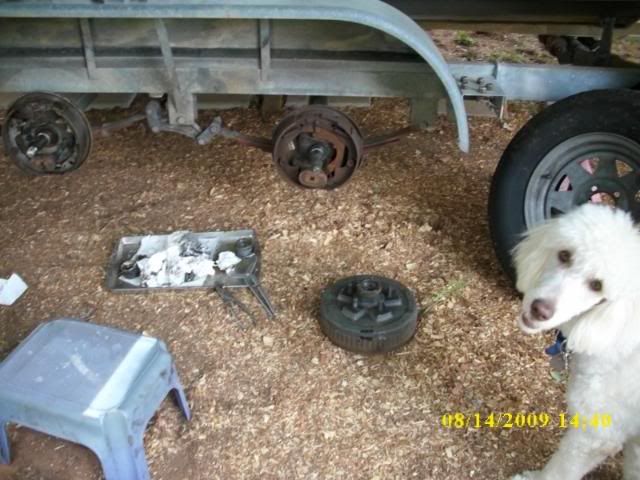
Next, a front mounted trailer hitch for exact placement of the trailer anywhere the first time.
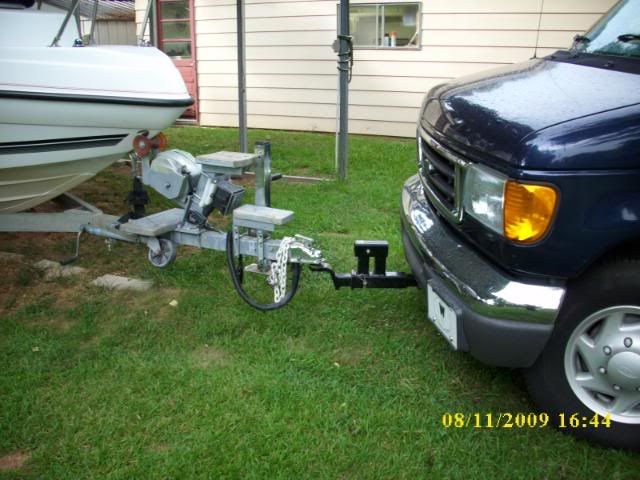
Don’t be lulled into using a pussy jack for getting your trailer off the ground. A pussy jack has a narrow body and short handle that has 3 positions:
1) the pumping position
2) the valve adjusting position
3) the moving the jack around position.
Pussy jack:
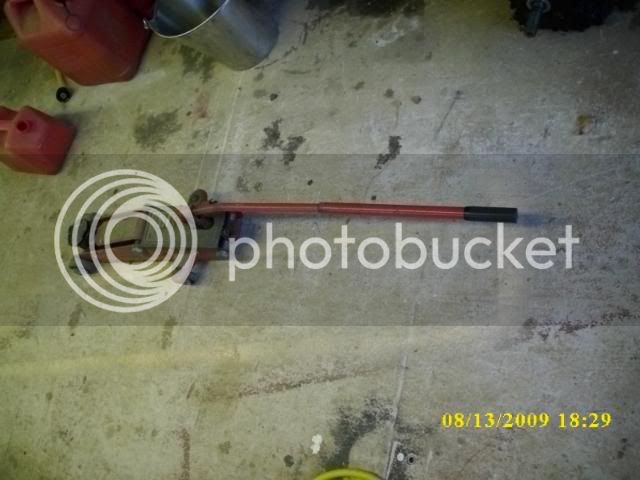
I use a big yellow jack that has a single position handle that’s long enough to get leverage for pumping and the body is wide enough that it doesn’t bury itself when used on turf.
Real jack
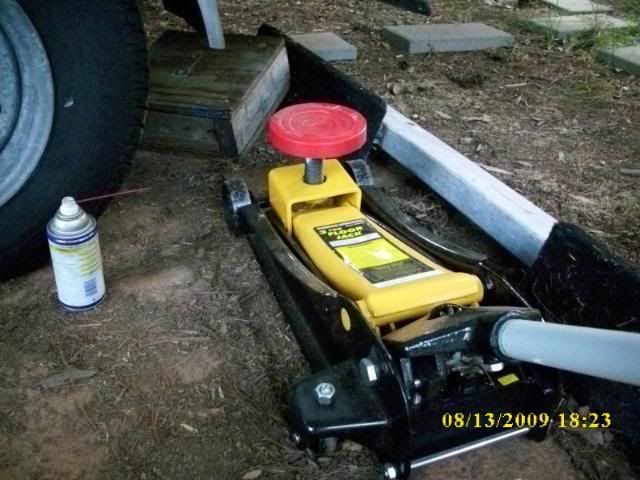
Dust cap remover tool, instead of banging on them with a hammer and screwdriver.
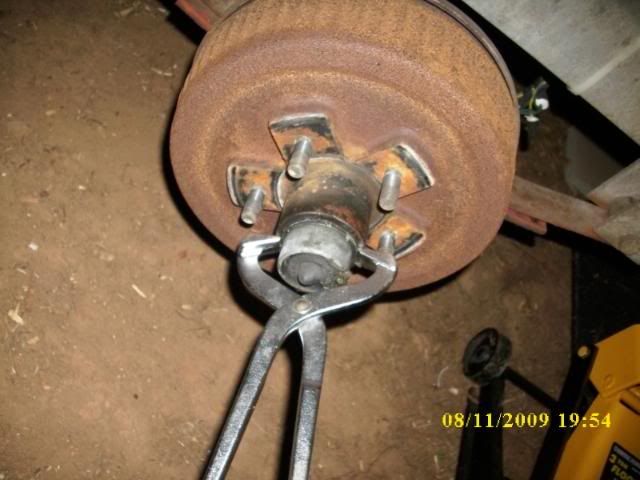
Keeper spring pliers.
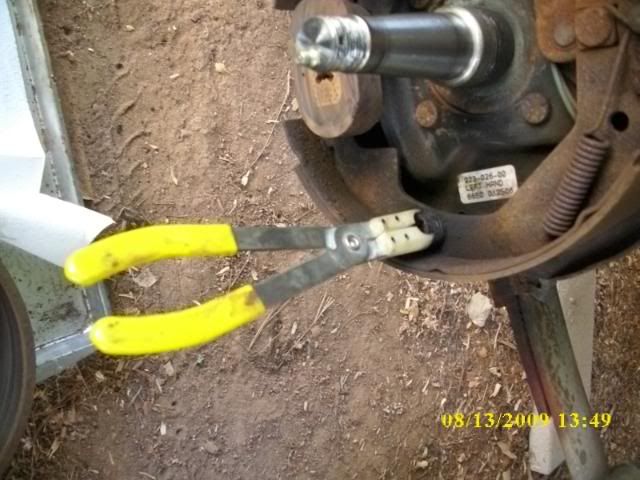
Brake spring pliers. These are indispensable for getting drum brake springs on and off.
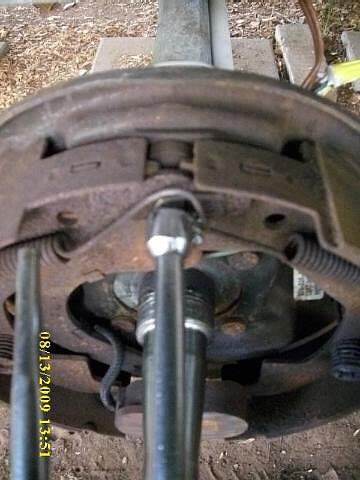
I forgot to take a pic of putting the spring back on, but it's a snap with the tool -- you're able to easily slide it over the post.
Anyway, these are my trailer secrets. Do you have any to share?
I don't pretend to be an expert; I just know what works for me. And I'm not trying to convince anyone what is right or wrong, just explaining how my trailering has evolved.
My first major satisfaction was to find trailer tires that hold up to the miles and abuse of my excessive trailering. This includes the entire Alaska Highway (which really isn't saying much as it's in better shape than most of our Interstates). I use car radials on my boat trailers. I've put over 40,000 miles on a set of these tires with no problems whatsoever. Just make sure they'll handle the weight you're towing.
The second satisfaction was getting rid of the clunking from the coupler and also eliminating hydraulics and bleeder screws, not to mention being able to apply my trailer brakes from the drivers seat. I use totally electric brakes on my boat trailer. I flush them after saltwater use either by a dunk in a freshwater lake on the way home, or by putting a sprinkler under the trailer for 1/2 hr or so.
The last tip is speed. I seldom if ever pull my trailer faster than 55 mph. This not only saves wear and tear on the rig, but also gets me 12mpg with my V10.
I installed my first set of electric trailer brakes about 4 years ago. I have eyeballed them while doing annual bearing exams, but have never serviced them. On my last 2 trips out, I had one of those brakes drag, as witnessed by excessive temps taken using an IR non-contact thermometer. I always check the hub temps at the first rest area, about 35 miles from home.
Nick’s rules for hub temp.
*If the IR temp is consistently less than 100°, then I loose interest in checking
*If the IR temp is between 100 and 200° I continue to check regularly (+/- 50 miles)
*If the IR temp is between 200 and 300° I let them cool and check them more often
*Over 300° and I find out what's causing it.
The last time out the temp was 330° at 35 miles so I backed off the star wheel to ‘unadjust’ the brakes on that wheel. We made the remainder of the 450 mile round trip with no subsequent problems. . I couldn’t get the pic at max temp cause I was busy working on the problem.

Back home, I pulled the drum to see what was causing the shoe to drag. There was rust in/on pivot points, which kept the shoes from fully retracting.

I wanted to see what it would take to make that brake serviceable so I had at it. ‘Rebuilding’ brakes is not on my acceptable list of maintenance items, for about $35 I could have replaced the entire backing plate -- shoes, mechanics, springs, magnet and adjuster, but I was curious. A well-placed shot of Corrosion Block at each pivot point and a dab of grease on the backing plate to shoe contact surfaces and we were back in business. But then I decided to pull it all the way off and take it apart to give it a real going over. Nothing else really needed attention so I put her back together using the obligatory new seal. I have seals with double lips and seals with rubber coated metal bodies (to prevent rust?). If you change them every year, I don’t think it much matters what kind you use.
One can find regular maintenance a hundred places on the web, so I won’t go into that, but I will note some time saving tools I use.
First, you’re going to need a helper for most trailer work. Here’s mine.

Next, a front mounted trailer hitch for exact placement of the trailer anywhere the first time.

Don’t be lulled into using a pussy jack for getting your trailer off the ground. A pussy jack has a narrow body and short handle that has 3 positions:
1) the pumping position
2) the valve adjusting position
3) the moving the jack around position.
Pussy jack:

I use a big yellow jack that has a single position handle that’s long enough to get leverage for pumping and the body is wide enough that it doesn’t bury itself when used on turf.
Real jack

Dust cap remover tool, instead of banging on them with a hammer and screwdriver.

Keeper spring pliers.

Brake spring pliers. These are indispensable for getting drum brake springs on and off.

I forgot to take a pic of putting the spring back on, but it's a snap with the tool -- you're able to easily slide it over the post.
Anyway, these are my trailer secrets. Do you have any to share?




